What's new?
Where We Work
Transport
The GMS Program is advancing intermodal transport, enhancing cross-border logistics, and improving road safety. It focuses on developing railways, ports, and inland waterways, and promoting investments in airports and secondary roads to boost regional connectivity and support underserved communities. The GMS Transport Sector Strategy 2030 provides a unified framework for cooperation in these efforts.
Environment
Natural ecosystems – and the food, water, energy, and other vital elements they provide – lie at the heart of the development of the GMS. How these natural resources are protected, managed, and enhanced will determine the long-term sustainability of its environment and economic development. The GMS Climate Change and Environmental Sustainability Program prioritizes actions to accelerate implementation of selected GMS-wide interventions towards meeting the national and international commitments on climate resilience, greenhouse gas mitigation, biodiversity conservation, and environmental sustainability.
Energy
New energy solutions are crucial to developing the GMS, where power demand is surging. The GMS Program promotes a just energy transition to low-carbon and renewable energy resources by (i) expanding clean energy trade, including the development of interconnections; (ii) initiating efficiency and conservation measures; and (iii) strengthening capacities for energy transition. Through the GMS Energy Transition Task Force, the program is creating an open platform for enhanced energy cooperation with the ASEAN and development partners.
Urban Development
By 2050, GMS is expected to be at least 50% urbanized. Careful planning is needed to balance urban growth with environmental protection and economic equity so that healthy cities can be enjoyed by all residents.
Trade & Transport Facilitation
The GMS Transport and Trade Facilitation Action Program is working to overcome existing barriers in order to link the subregion to the ASEAN Economic Community’s single market and production base, as well as other regional cooperation initiatives.
Health Cooperation
GMS health priorities focus on communicable disease control. The GMS Program also aims to accelerate universal health coverage, strengthen health systems to manage public health threats, and support compliance with the World Health Organization’s International Health Regulations through a unified “One Health Approach.” The new GMS Health Cooperation Strategy 2024-2030 aims to guide programming, foster innovation, increase engagement with key stakeholders, and mobilize new project financing.
Tourism
GMS tourism promotes post-COVID-19 pandemic recovery efforts and the development of higher value-added and secondary destinations. It will also strengthen human capital, connectivity infrastructure, public–private linkages, and environmental sustainability. Countries in the GMS are working together to promote the subregion as a single destination with diverse, high-quality subregional products, distributing tourism benefits widely while minimizing adverse impacts.
Agriculture
GMS has a great opportunity to be a major supplier of safe and environment-friendly agriculture products. The GMS-2030 Kunming Strategic Framework for Transformation of Agrifood Systems (GMS 2030 KSFTAS) addresses the evolving needs of the subregion’s agricultural sector, while aligning with broader GMS cooperation initiatives. It outlines a strategy for transforming the agrifood trade as a crucial economic driver through sustainable farming systems, low-carbon and climate resilient value chains, digital technologies, and financing mechanisms to enhance livelihoods, reduce food loss, and meet the rising demand for safe, high quality, and green products.
Latest Publications
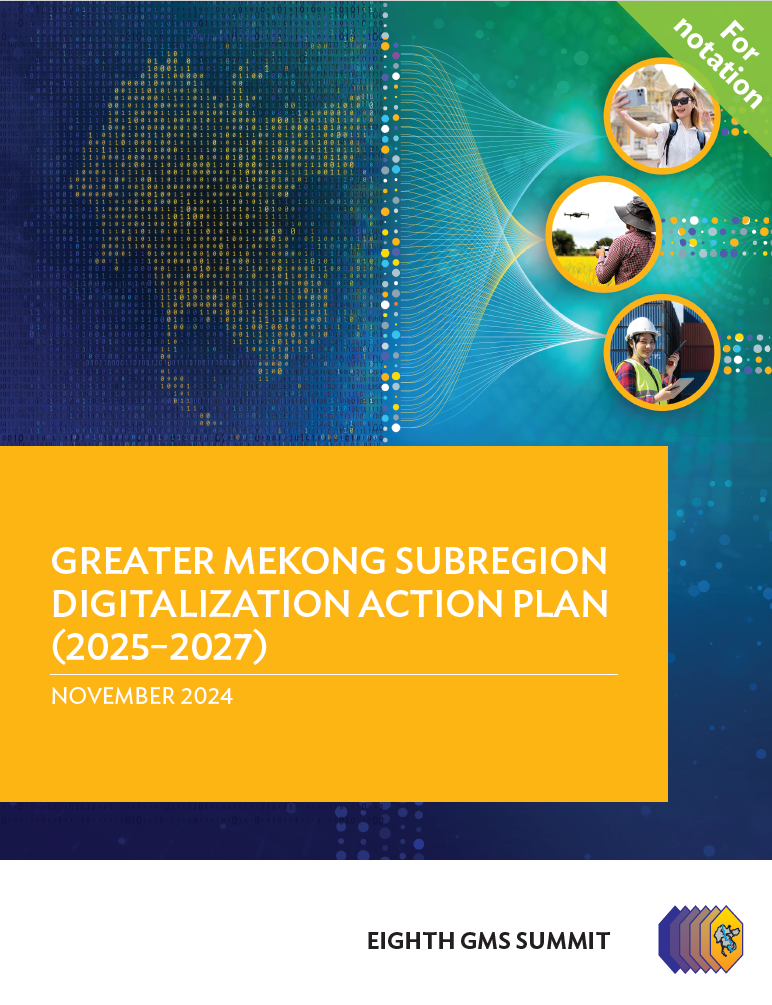
GMS Digitalization Action Plan (2025–2027)
This was developed based on the Scoping Study on Digitalization in the GMS, presented for notation in the 26th GMS Ministerial Conference, and a complement to the GMS Digital Economy Cooperation Initiative, which was developed and proposed by the People’s Republic of China and endorsed by the 25th GMS Ministerial Conference.
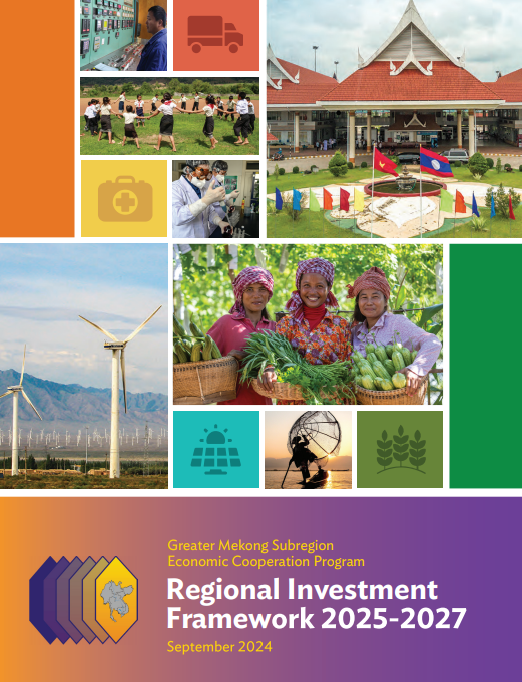
Regional Investment Framework 2025-2027
The Greater Mekong Subregion (GMS) Regional Investment Framework 2025–2027 (RIF 2027) is the subsequent 3-year rolling pipeline of projects of the GMS Program. It is comprised of 176 projects across the countries and sectors of the GMS program.

GMS Digitalization Action Plan (2025–2027)
This was developed based on the Scoping Study on Digitalization in the GMS, presented for notation in the 26th GMS Ministerial Conference, and a complement to the GMS Digital Economy Cooperation Initiative, which was developed and proposed by the People’s Republic of China and endorsed by the 25th GMS Ministerial Conference.
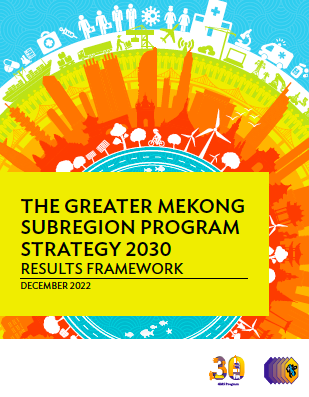
The Greater Mekong Subregion Program Strategy 2030: Results Framework
The GMS Secretariat, in close coordination with GMS countries, will prepare a results framework to trace the implementation of GMS-2030...

Report to the Leaders on Recent Achievements and Directions of GMS Cooperation
This document outlines the achievements of the GMS Program since the 7th GMS Summit. This report has three parts: I – The Work and Accomplishments of the GMS Program Since the Last Summit; II – The Various Deliverables for the 8th GMS Summit; and III – The Proposed Future Directions for the GMS Program.
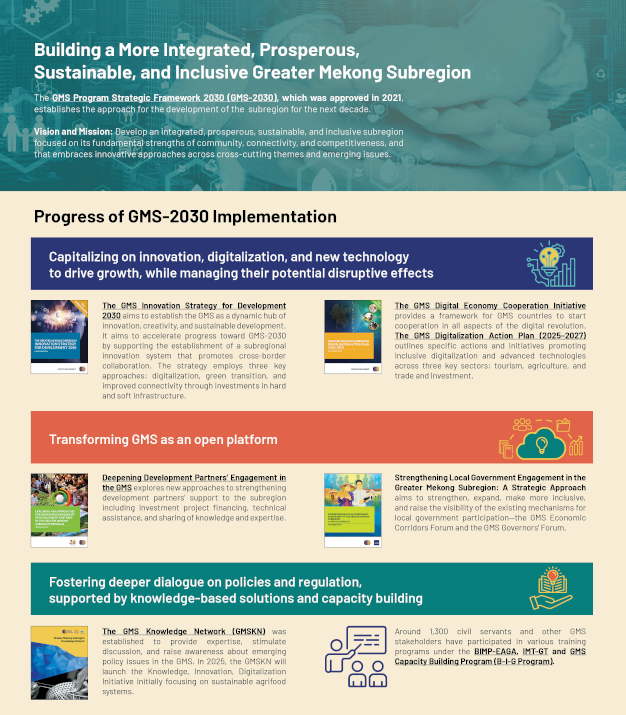
Greater Mekong Subregion Infographics 2024
The latest GMS infographic gives a snapshot of progress in implementing the GMS Economic Cooperation Program Strategic Framework (GMS-2030).

GMS-2030 Kunming Strategic Framework for Transformation of Agrifood Systems
GMS has a great opportunity to be a major supplier of safe and environment-friendly agriculture products. The GMS-2030 Kunming Strategic Framework for Transformation of Agrifood Systems (GMS 2030 KSFTAS) addresses the evolving needs of the subregion’s agricultural sector, while aligning with broader GMS cooperation initiatives. It outlines a strategy for transforming the agrifood trade as a crucial economic driver through sustainable farming systems, low-carbon and climate resilient value chains, digital technologies, and financing mechanisms to enhance livelihoods, reduce food loss, and meet the rising demand for safe, high quality, and green products.
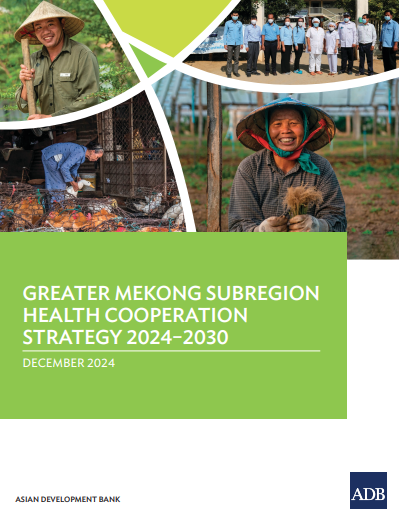
GMS Regional Health Cooperation Strategy 2024-2030
The GMS Health Cooperation Strategy 2024-2030 builds upon the previous 2019-2023 strategy and two decades of development partner support, including the Asian Development Bank.
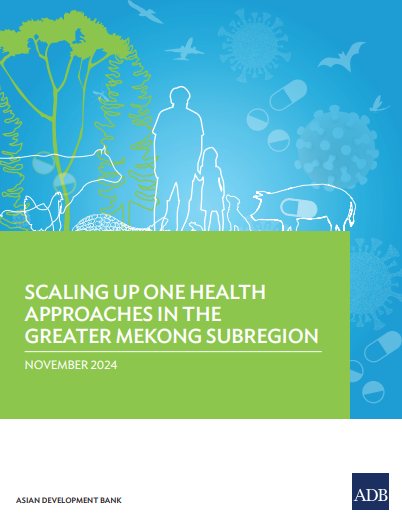
Scaling Up One Health Approaches in the Greater Mekong Subregion
The publication addresses the use of wildlife, underlines the need to ramp up action against diseases such as rabies, and shows why countries should build up their animal health capacities.
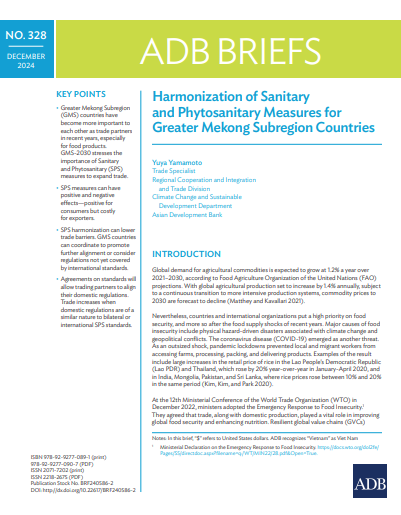
Harmonization of Sanitary and Phytosanitary Measures for Greater Mekong Subregion Countries
Pointing to rising trade between GMS countries and explaining the link between food security and global value chains, the brief shows how some exporters may initially be impacted by SPS measures due to adaptation costs.

Greater Mekong Subregion Gender Strategy Implementation Plan 2025-2030
This report shows how improving gender mainstreaming via the Greater Mekong Subregion Economic Cooperation Program Strategic Framework 2030 (GMS-2030) can bolster inclusivity and ensure women benefit equally from regional cooperation initiatives.
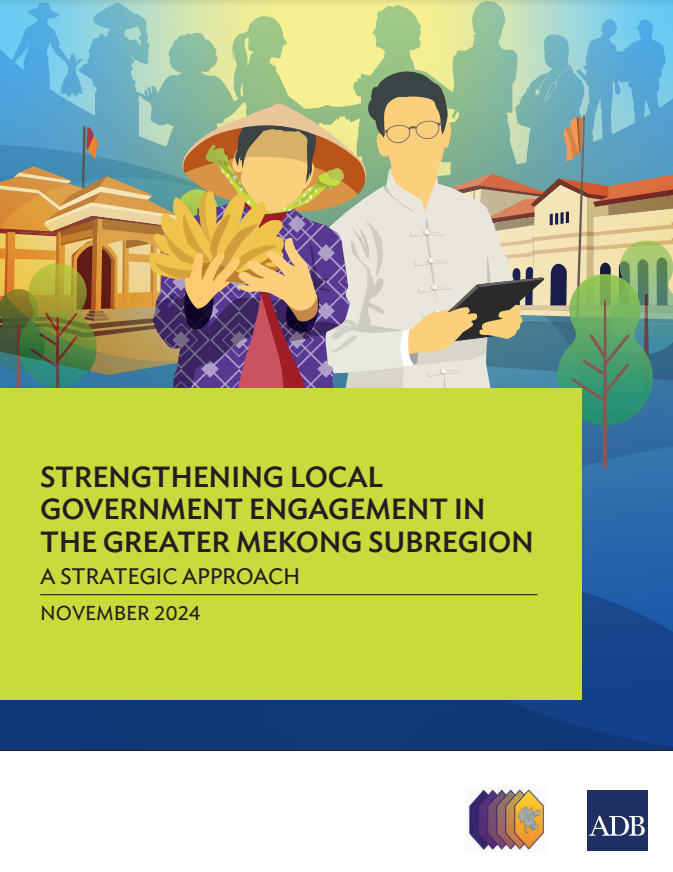
Strengthening Local Government Engagement in the Greater Mekong Subregion: A Strategic Approach
Outlining a strategy designed to boost local government participation in the Greater Mekong Subregion (GMS) Economic Cooperation program, this report presents practical implications and offers recommendations to help drive a more sustainable future.

GMS 2030 Strategic Framework for Accelerating Climate Action and Environmental Sustainability
The GMS 2030 Strategic Framework for Accelerating Climate Action and Environmental Sustainability aims to prioritize actions to accelerate implementation of selected GMS-wide interventions towards meeting the national and international commitments on climate resilience, greenhouse gas mitigation, biodiversity conservation, and environmental sustainability.

GMS Digitalization Action Plan (2025–2027)
This was developed based on the Scoping Study on Digitalization in the GMS, presented for notation in the 26th GMS Ministerial Conference, and a complement to the GMS Digital Economy Cooperation Initiative, which was developed and proposed by the People’s Republic of China and endorsed by the 25th GMS Ministerial Conference.

Regional Investment Framework 2025-2027
The Greater Mekong Subregion (GMS) Regional Investment Framework 2025–2027 (RIF 2027) is the subsequent 3-year rolling pipeline of projects of the GMS Program. It is comprised of 176 projects across the countries and sectors of the GMS program.

GMS Digitalization Action Plan (2025–2027)
This was developed based on the Scoping Study on Digitalization in the GMS, presented for notation in the 26th GMS Ministerial Conference, and a complement to the GMS Digital Economy Cooperation Initiative, which was developed and proposed by the People’s Republic of China and endorsed by the 25th GMS Ministerial Conference.

The Greater Mekong Subregion Program Strategy 2030: Results Framework
The GMS Secretariat, in close coordination with GMS countries, will prepare a results framework to trace the implementation of GMS-2030...

Report to the Leaders on Recent Achievements and Directions of GMS Cooperation
This document outlines the achievements of the GMS Program since the 7th GMS Summit. This report has three parts: I – The Work and Accomplishments of the GMS Program Since the Last Summit; II – The Various Deliverables for the 8th GMS Summit; and III – The Proposed Future Directions for the GMS Program.

Greater Mekong Subregion Infographics 2024
The latest GMS infographic gives a snapshot of progress in implementing the GMS Economic Cooperation Program Strategic Framework (GMS-2030).

GMS-2030 Kunming Strategic Framework for Transformation of Agrifood Systems
GMS has a great opportunity to be a major supplier of safe and environment-friendly agriculture products. The GMS-2030 Kunming Strategic Framework for Transformation of Agrifood Systems (GMS 2030 KSFTAS) addresses the evolving needs of the subregion’s agricultural sector, while aligning with broader GMS cooperation initiatives. It outlines a strategy for transforming the agrifood trade as a crucial economic driver through sustainable farming systems, low-carbon and climate resilient value chains, digital technologies, and financing mechanisms to enhance livelihoods, reduce food loss, and meet the rising demand for safe, high quality, and green products.

GMS Regional Health Cooperation Strategy 2024-2030
The GMS Health Cooperation Strategy 2024-2030 builds upon the previous 2019-2023 strategy and two decades of development partner support, including the Asian Development Bank.

Scaling Up One Health Approaches in the Greater Mekong Subregion
The publication addresses the use of wildlife, underlines the need to ramp up action against diseases such as rabies, and shows why countries should build up their animal health capacities.

Harmonization of Sanitary and Phytosanitary Measures for Greater Mekong Subregion Countries
Pointing to rising trade between GMS countries and explaining the link between food security and global value chains, the brief shows how some exporters may initially be impacted by SPS measures due to adaptation costs.

Greater Mekong Subregion Gender Strategy Implementation Plan 2025-2030
This report shows how improving gender mainstreaming via the Greater Mekong Subregion Economic Cooperation Program Strategic Framework 2030 (GMS-2030) can bolster inclusivity and ensure women benefit equally from regional cooperation initiatives.

Strengthening Local Government Engagement in the Greater Mekong Subregion: A Strategic Approach
Outlining a strategy designed to boost local government participation in the Greater Mekong Subregion (GMS) Economic Cooperation program, this report presents practical implications and offers recommendations to help drive a more sustainable future.

GMS 2030 Strategic Framework for Accelerating Climate Action and Environmental Sustainability
The GMS 2030 Strategic Framework for Accelerating Climate Action and Environmental Sustainability aims to prioritize actions to accelerate implementation of selected GMS-wide interventions towards meeting the national and international commitments on climate resilience, greenhouse gas mitigation, biodiversity conservation, and environmental sustainability.
Latest News
BIMP-EAGA and GMS: Building Blocks for the ASEAN Power Grid
The meeting which took place on the sidelines of the 20th Asia Clean Energy Forum (ACEF) explored the role of BIMP-EAGA and GMS as building blocks in advancing the ASEAN Power Grid (APG).
First Meeting of the Greater Mekong Subregion (GMS) Task Force on Gender
The First Meeting of the Greater Mekong Subregion (GMS) Task Force on Gender convened virtually on 5 June 2025, organized by the GMS Program Secretariat. Mr. Asadullah Sumbal of the GMS Secretariat delivered opening remarks on behalf of Mr. Alfredo Perdiguero, Head of the GMS Secretariat, underscoring the GMS Program’s strong commitment to advancing gender equality and social inclusion as core elements of regional cooperation.
Third Mekong Dialogue on Labor Mobility
On 29 May 2025, the Ministry of Labor and Social Welfare (MOLSW) of the Lao People’s Democratic Republic (Lao PDR) hosted the Third Mekong Dialogue on Labor Mobility in Luang Prabang City, with support from the Asian Development Bank (ADB) and the International Organization for Migration (IOM).
First Meeting of GMS Working Group on Trade and Investment and Workshop on Model Law of Electronic Transferable Records
The workshop on the Model Law of Electronic Transferable Records (MLETR) and the First Meeting of GMS Working Group on Trade and Investment were held on 28-29 May 2025 in Siem Reap, Cambodia.
Honing Project Management Skills to Achieve Development Goals
Thirty-nine government officials and specialists joined this year’s Regional Training in Project Management organized by the Asian Development Bank (ADB) in Bangkok from 5 to 9 May. The training program is designed to support the Brunei Darussalam–Indonesia–Malaysia–Philippines East ASEAN Growth Area (BIMP-EAGA), Indonesia–Malaysia–Thailand Growth Triangle (IMT-GT), and the Greater Mekong Subregion (GMS) in project planning and implementation. It fosters a results-based project management approach that aligns projects to sector strategies.
Cambodia’s tourism sector breaks new ground, earns $3.63 billion
The Kingdom received 6.7 million international tourists last year, up 22.9 percent from 5.45 million in the year before, read the report.
Thailand Aims for 2030 Launch of Railway Link to PRC
The Government of Thailand has announced that its ambitious high-speed railway project connecting the country to the People’s Republic of China (PRC) through the Lao People’s Democratic Republic (Lao PDR) is scheduled to begin operations in 2030.









